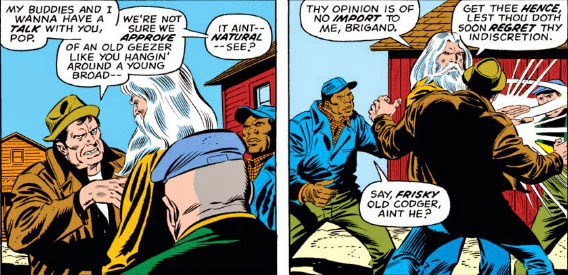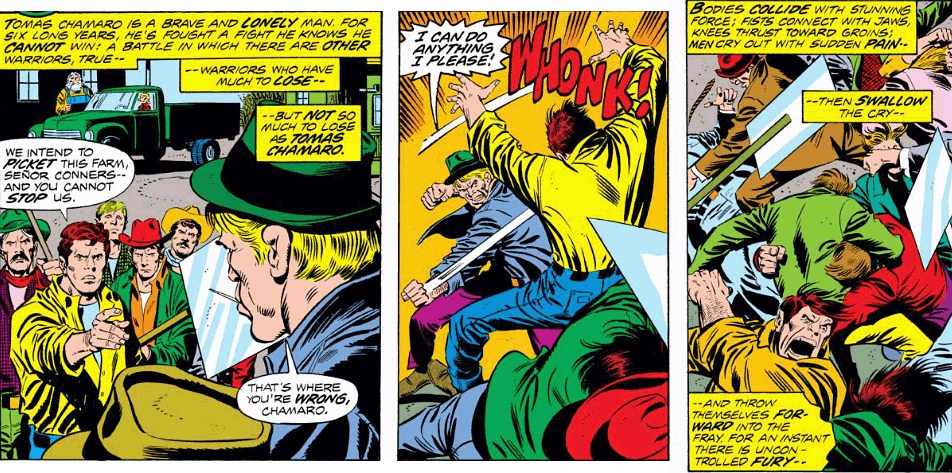If you're familiar with Donald Blake, Thor's human form who transformed to the God of Thunder in times of need, then you'll likely remember this famous scene which helps to explain why Odin felt that his son needed to live for a time as a mortal:
But, what of Odin himself? The Lord of Asgard has more than once shown that he can be just a tad headstrong, wielding his supremacy like a club. Couldn't even the All-Father stand to learn a little humility?
Which humbly opens the door to another
Marvel Trivia Question
Did almighty Odin ever live amongst mortals as a mortal?
It's Thor himself who receives the answer to this question, when a crisis erupts on Earth involving Asgard's warriors (bewitched by Loki), and Odin is nowhere to be found. But Odin's Vizier arrives to give Thor the bad news:
In true Odin fashion, Odin slipped away into this new identity without a word to anyone--even the Vizier, who apparently had to do a little digging to get the facts. So, how is the All-Father making out as a mere mortal? What do you say we assume that Thor deals successfully with this Loki situation, and shift our gaze to the state of California and a communal residence of migrant workers, where one particular senior citizen has caught the news on the events involving Thor and is lost in thought:
We get the impression that "Orrin" has fit in quite well with these workers--and why not? Even at his age, working in the fields is probably trifling compared to wielding a sword against frost giants. Though it seems that even here in these quiet fields, danger manages to find an Asgardian no matter what form he takes:
Yes, I know--it's a good guess that what Orrin was really about to say was, "Judith, shut up!" Jeez, a man steps out to enjoy his pipe, and instead he gets a rambling lecture. I wonder how Judith would react if she knew the guy she was talking to routinely kept a roving eye on the universe. You can't get much more informed than that.
At any rate, let's see how Orrin deals with his first drunk driver:
Time passes, and Orrin acclimates to his life in Judith's commune--never aware of his true identity as Odin, but still nagged by his loss of memory as any amnesiac would be:
As you can see, it looks like trouble has found Orrin again, this time in the form of what would be a street brawl with some unruly townsfolk. And if you're thinking that Orrin will have about as much trouble with them as he did with an onrushing vehicle, that's putting it mildly:
This time, Orrin's feats of strength play out in front of Judith's direct line of sight, and in the light of day. So it's just a matter of time before he's approached to consider using his strength on a larger scale.
That brings us to Tomas Chamaro, a local activist who targets one of the farms for picketing, only to be warned off in no uncertain terms by those who want to maintain the status quo. But Chamaro finds that the meeting is short on warnings, and quick on a violent response:
Orrin, nearby, spots the vicious fighting, and appears to have made his decision regarding his level of involvement in the dispute.
Judith, however, feels that Orrin has gone overboard, and moves to intervene:
We can see that Chamaro obviously thinks he's found a good candidate to join his ranks, though Conners doesn't appear to have any intention of letting Orrin's actions build momentum. As for Orrin, he clearly sees nothing wrong with stopping the "madness" of violence by using a greater level of violence, his anger and impatience getting the better of him. The Asgardian in him--the Odin in him--is still at the heart of his actions, brutally putting down any disregard of his wishes. To Orrin, "cease and desist" would be a phrase used more as a command than a plea--and it may be Judith who's unknowingly helping him to see the difference.
It isn't long before Conners returns with his crew, this time to bust in on one of Chamaro's meetings and finish what they started with him. And again Orrin moves to help, but this time with new perspective:
The dispute between Chamaro and Conners is about to recede into the background, when a new threat to the area rears its head--or, in this case, its pyramid:
The pyramid heralds the arrival of three ancient Egyptian figures, which the news media identifies as legendary gods. And as they reveal themselves, Orrin mysteriously becomes enthralled and begins to approach the entrance as in a trance, with no one able to stop him:
Meanwhile, Thor has returned to Asgard and, though an audience with the head of Mimir, learns not only of the Egyptians but also that Odin has become somehow involved with them. And when he arrives to investigate, he discovers not only a growing threat, but that his father is now part of that threat:
Still bereft of his true origins, but now also possessed by an Egyptian spirit, Odin prepares to face Thor in the form of Atum-Re, a form given him by the Egyptians so that he might aid them in their battle against Seth, their death-god. And while Thor's obeisance allows him to make some minor headway against the Egyptians' spell over his father, he soon finds it's not enough to turn the tide:
With Thor's hands tied--unwilling to either battle his father or abandon him--a compromise is finally reached with the Egyptians:
And a good thing, too. Because Thor's might is going to be appreciated--as the moment to face Seth's death hordes finally comes, and the Egyptians find that their thrall isn't exactly hell on wheels in his current state. In other words, he can't hit the broad side of a barn (er, chariot):
But, at a crucial point, Atum-Re does make a strike that gives the Egyptians the leverage they need to cast out Seth and prevail. And when "Orrin" and Thor return to Earth, and Thor displaces the pyramid away, Odin regains his memories, and his time as a mortal is concluded. But Odin's not home free yet--because when he transports back to Asgard, it's only later discovered that he never truly arrived, beginning a whole new adventure that would lead to his apparent death.
































3 comments:
I loved the four issues that immediately followed this storyline, where Thor encounters Zarrko the Tomorrow Man and the Time Twisters.
I enjoyed seeing ol' Odin slap down the podunks.
We coulda used him in my hometown.
Reading this again after many years, I'm reminded of my grandfather, who looked like Odin and was a big enormous guy with a big white head of hair and walked around in overalls. That's all he wore. He didn't smoke a pipe, just Camels.
I remember being about four, sitting on his knee, and thinking he was some kind of giant. Unlike Odin, though, he was a pretty jolly person. I liked him!
Post a Comment